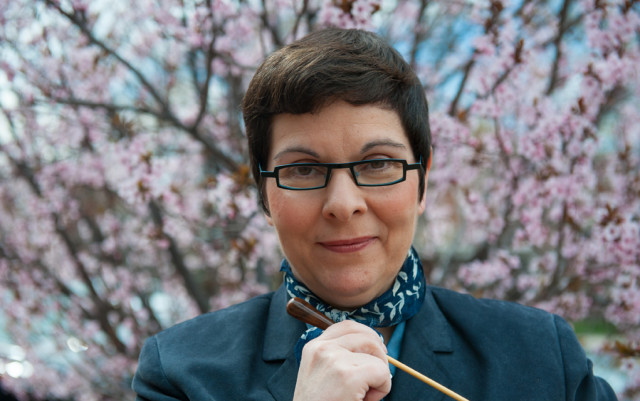
Composers who write their own musical eulogies do not usually create jolly pieces.
Dmitri Shostakovich, who suffered various forms of personal and artistic oppression throughout his career, was certainly no exception. When he wrote his Eighth String Quartet in 1960 he was contemplating suicide — which his friends prevented, fortunately. The work he wrote, dedicated to “the victims of fascism and war” but also reflecting his own suffering under the Soviet regime, remains a powerful testament to a low point in his life.
“This is really dark,” says Cynthia Katsarelis, who will conduct the string orchestra version of the quartet, the Chamber Symphony for String Orchestra, with the Colorado Pro Musica Chamber Orchestra Friday in Denver and Saturday in Boulder. “He thought it was his own eulogy.”
The concerts are part of a two-year celebration of Shostakovich chamber music organized by the Colorado Chamber Players. Other works on the program will be the world premiere of Life Between Lives by American guitarist/composer D.J. Sparr, J.S. Bach’s Third Brandenburg Concerto and the Study for Strings by Pavel Haas.
The quartet may be dark, but it is recognized as one of the composer’s greatest works.
“Shostakovich was one of the great composers of the 20th century, one of the great symphonists, one of the great string quartet writers,” Katsarelis says. “This is (the quartet) I find the most compelling.”
Shostakovich was inspired to write the quartet when he visited Dresden, as part of a project to memorialize the World War II firebombing that destroyed the city. He was so moved that he wrote the quartet in three days. Some believe that the official dedication — “to the victims of fascism and war” — was done at the behest of the Soviet authorities, and that Shostakovich actually intended the dedication for all victims of totalitarianism, himself included.
As often with Shostakovich, the truth is elusive, but there is no question that he filled the score with references to himself and his work. The opening motive, one that is repeated throughout, is four notes that in German spell the letters DSCH — a musical anagram taken from the letters of his first and last names.
Elsewhere, the score is filled with transformed quotations from his works, including the First and Fifth symphonies, the First Cello Concerto, the Second Piano Trio and the opera Lady Macbeth of Mtsensk — a work that had triggered denunciations of the composer from Stalin himself.
Another prominent motive is three repeated notes, like a knock. In Soviet times, that was a widely recognized code for the KGB, and the ominous midnight knock on the door that so many Russians feared. Katsarelis notes that “he was worried his whole life that he would hear the knock at the door and be taken away forever.” In fact, he kept a packed bag by the door for that possibility.
Composer Pavel Hass was one of the victims of World War II. The Czech composer was imprisoned in the Terezín concentration camp, along with many other Jewish musicians. His Study for Strings was one of several works composed and performed in the camp. Near the end of the war, Haas was shipped to Auschwitz, where he was killed.
Karel Ancerl, a Czech conductor who was interned with Haas at Terezín and survived Auschwitz, found four of the five parts to the Study for Strings after the war. The missing part was reconstructed, making performances possible.
“It’s a terrific piece,” Katsarelis says. “It was composed in the summer of 1943 and was performed twice. It speaks marvelously to the human spirit that something beautiful and wonderful could be created under those circumstances — and to the power of music and the need for music in our hearts.”
The concert will open with a much sunnier work, Bach’s lively Third Brandenburg Concerto for three violins, three violas, three cellos, bass and harpsichord.
“It’s going to be really fun and energetic,” Katsarelis says.
D.J. Sparr based his Life Between Lives on the instrumentation and the use of instruments — but not the themes — of the Third Brandenburg. The composer told Katsarelis that he wrote it in the style of Eastern European minimalism, such as the meditative music of Arvo Pärt.
“The first movement, which opens rather slow, is that sort of thing,” she says. “The whole construction is just terrific because it starts from this meditative, slow place and gradually builds up speed until it’s really quite powerful.”
Katsarelis likes the way the four pieces fit together. “The Bach goes with the Shostakovich, the Haas goes emotionally and musically with the Shostakovich, and the Sparr piece is a very interesting modern work that pays homage while giving contrast,” she says. “This is one of the coolest programs of all time.”
On the Bill: Shostakovich: Dedication. Pro Musica Colorado Chamber Orchestra, Cynthia Katsarelis, conductor. 7:30 p.m. Friday, Jan. 22, First Baptist Church, 1373 Grant St., Denver.
7:30 p.m. Saturday, Jan. 23, First United Methodist, 1421 Spruce St., Boulder. For more information: 720-443-0565 and
promusicacolorado.org.














